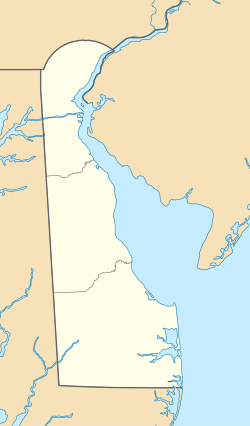Cathedral of Saint Peter (Wilmington, Delaware)
| Cathedral of Saint Peter | |
|---|---|
 |
|
| 39°44′34″N 75°33′12″W / 39.7428°N 75.5532°WCoordinates: 39°44′34″N 75°33′12″W / 39.7428°N 75.5532°W | |
| Location | West 6th Street Wilmington, Delaware |
| Country | United States |
| Denomination | Roman Catholic Church |
| Website | www.cathedralofstpeter.com |
| History | |
| Founded | 1869 |
| Consecrated | 1905 |
| Architecture | |
| Architect(s) | Pierre Bauduy |
| Style | Romanesque Revival |
| Completed | 1818 |
| Specifications | |
| Length | 60 feet (18 m) |
| Width | 30 feet (9.1 m) |
| Materials | Brick |
| Administration | |
| Diocese | Wilmington |
| Clergy | |
| Bishop(s) | Most Rev. William F. Malooly |
| Rector |
Rev. Leonard R. Klein |
| Part of | Quaker Hill Historic District (#79000635 and #85003221) |
| Added to NRHP | December 19, 1985 |
Rev. Leonard R. Klein
The Cathedral of Saint Peter is the mother church of the Roman Catholic Diocese of Wilmington in Wilmington, Delaware. Located on West 6th Street, the cathedral is located in the Quaker Hill Historic District.
The church was designed by Pierre Bauduy, who also designed Wilmington's town hall. The cornerstone was laid in 1816; the 30- by 40-foot (9.1- by 12-meter) Romanesque church was executed in brick and dedicated on September 12, 1818. The first Mass was said inside the structure the next day by Father Patrick Kenny. In 1829, a bell tower was installed and the church was extended to its current length of 60 feet (18 m).
Extensive remodeling was performed between 1870 and 1905—improvements included work on frescoes, the addition of a marble baptistery, three altars, a chancel railing, a barrel-domed roof, and the bishop's cathedra. (The Diocese of Wilmington had been erected by Pope Pius IX in 1868.) The refurbishment was completed and the church was ready to be consecrated as the diocesan cathedral in 1905. When the apostolic pro-nuncio arrived, however, he noticed that the church was joined to a rectory and a school—since a cathedral must be free-standing and debt free, he refused and it was designated a pro-cathedral instead. The necessary changes were gradually made, and the church was eventually designated the cathedral of the diocese.
The cathedral's Munich-style stained glass dates from about 1900, and was probably created by Franz Xavier Zettler, master glass painter to the Royal Court of Bavaria from 1870 to 1910, or his pupil, Franz Mayer.
...
Wikipedia

